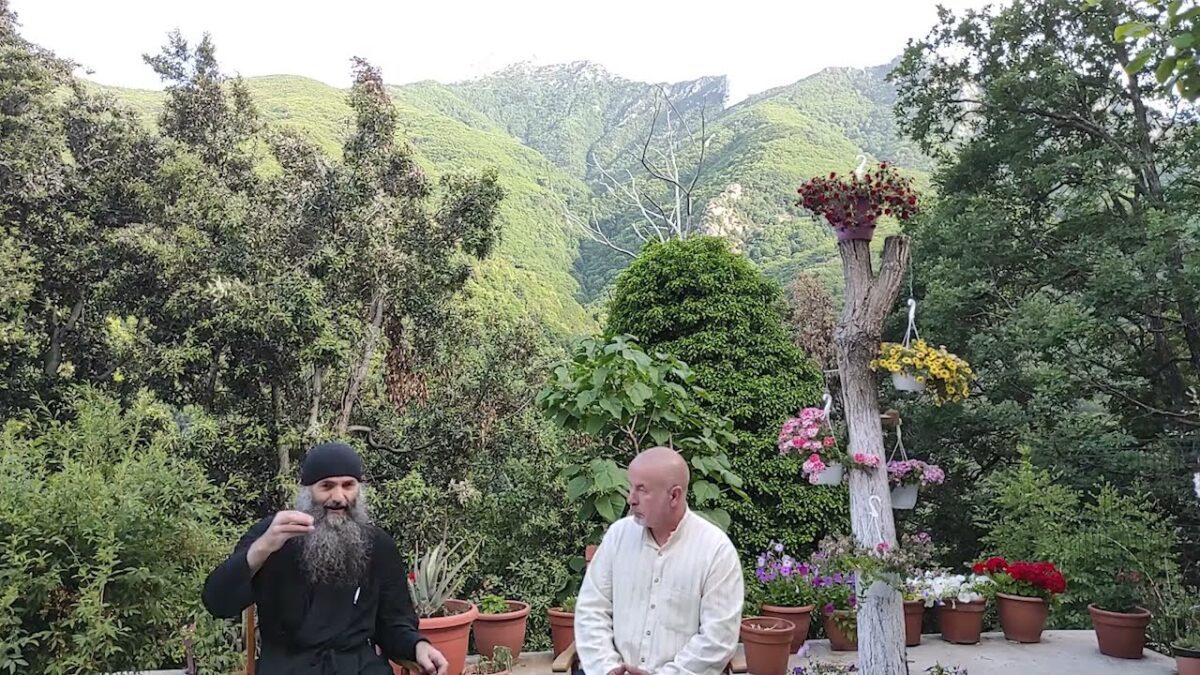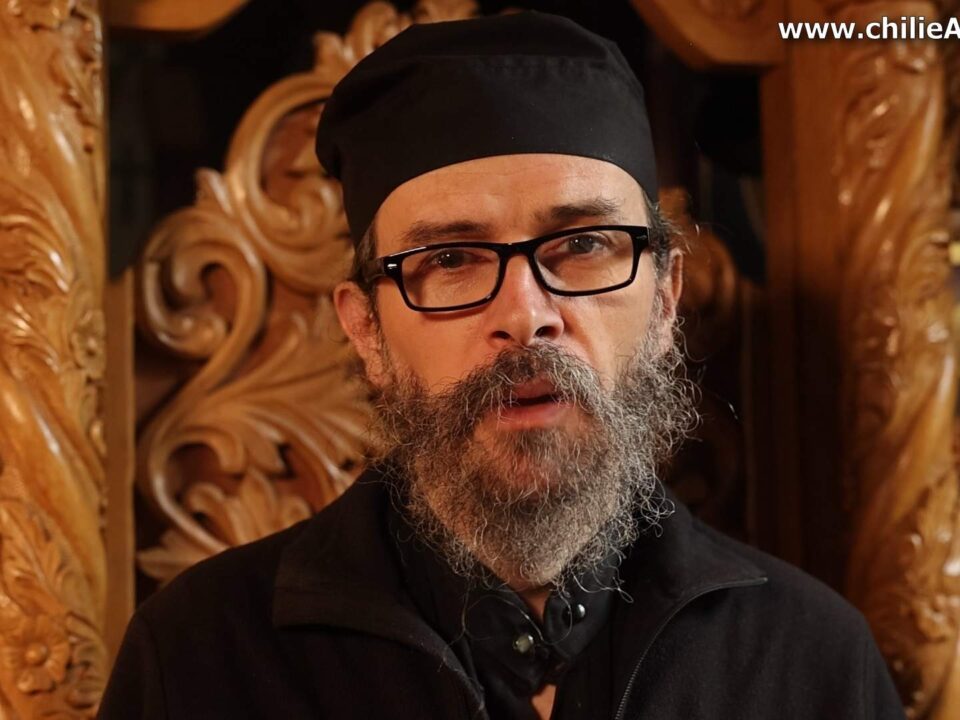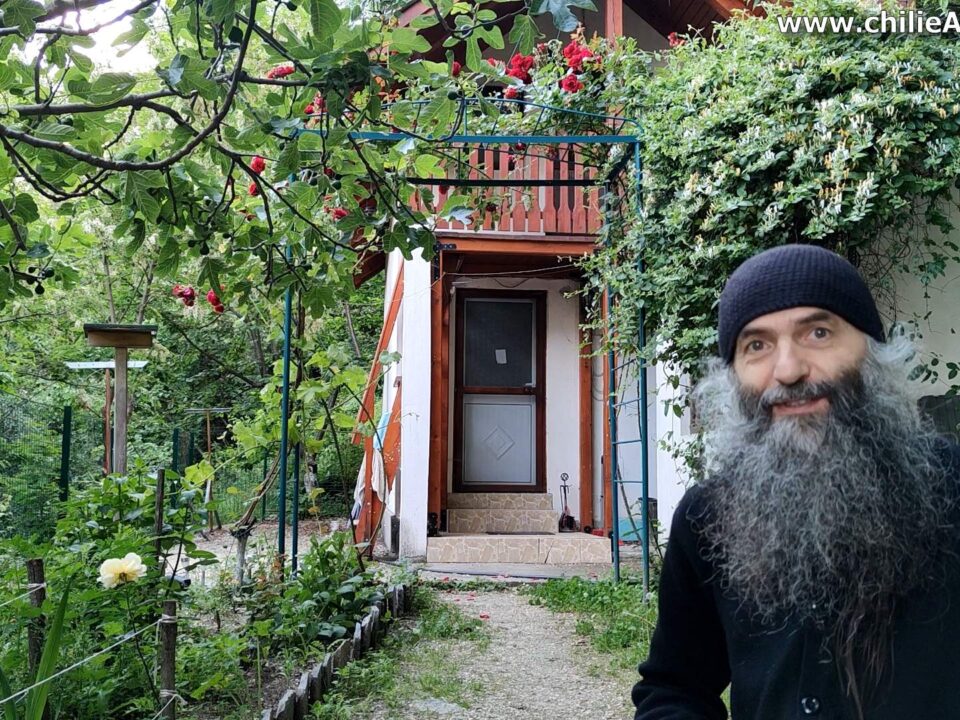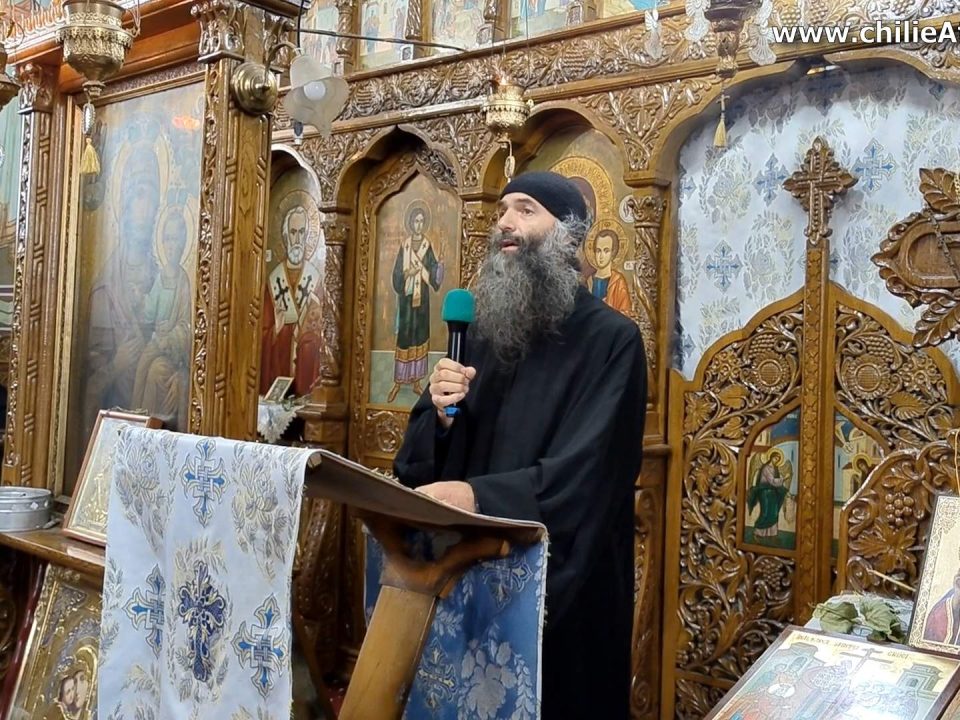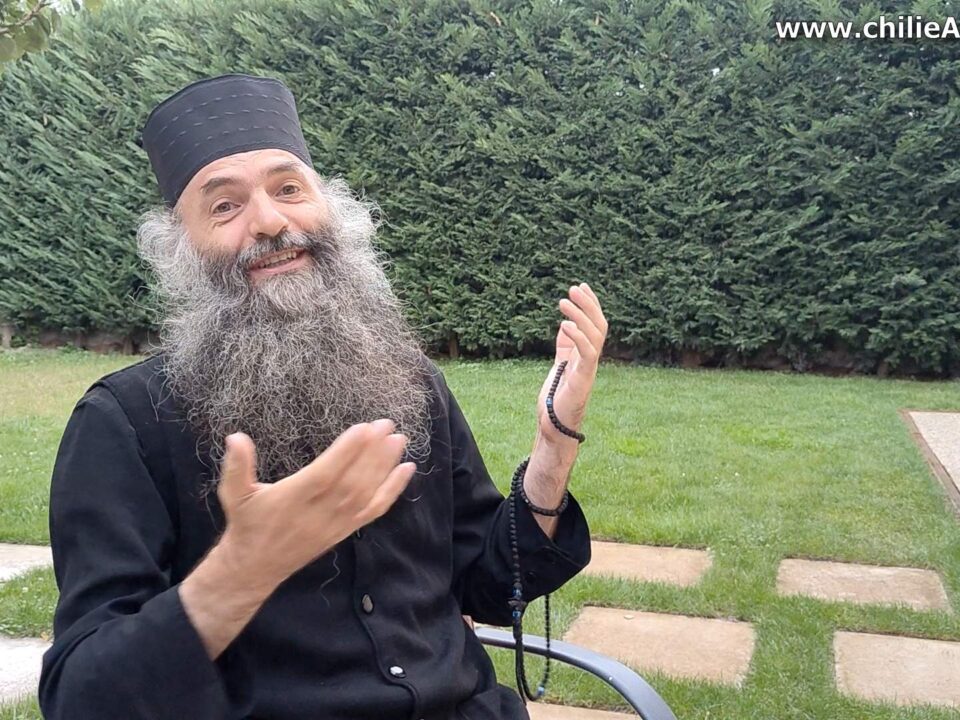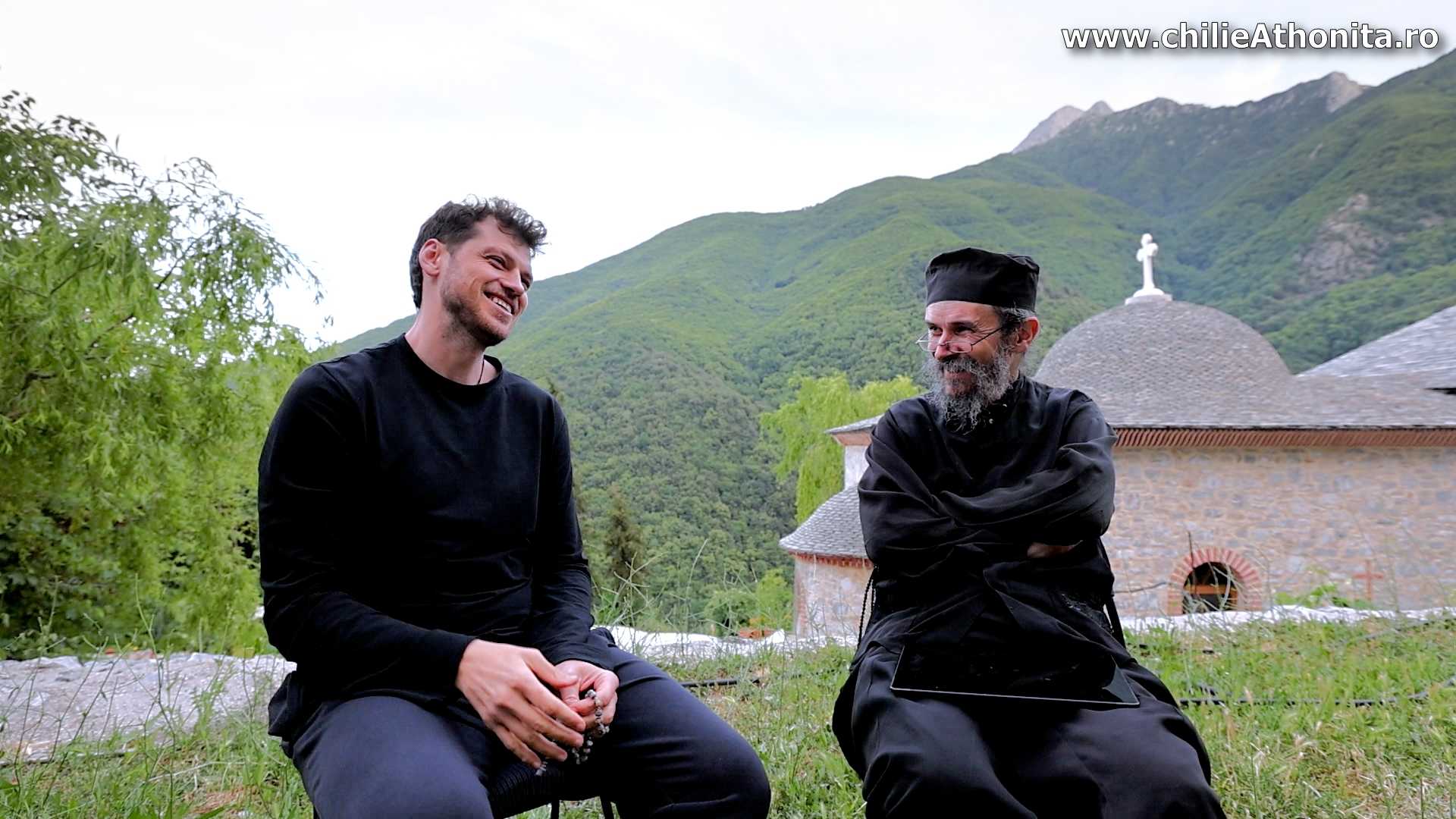
Youth, West, East and Orthodoxy With Sorin Gadola and Fr. Theologos
14 June 2022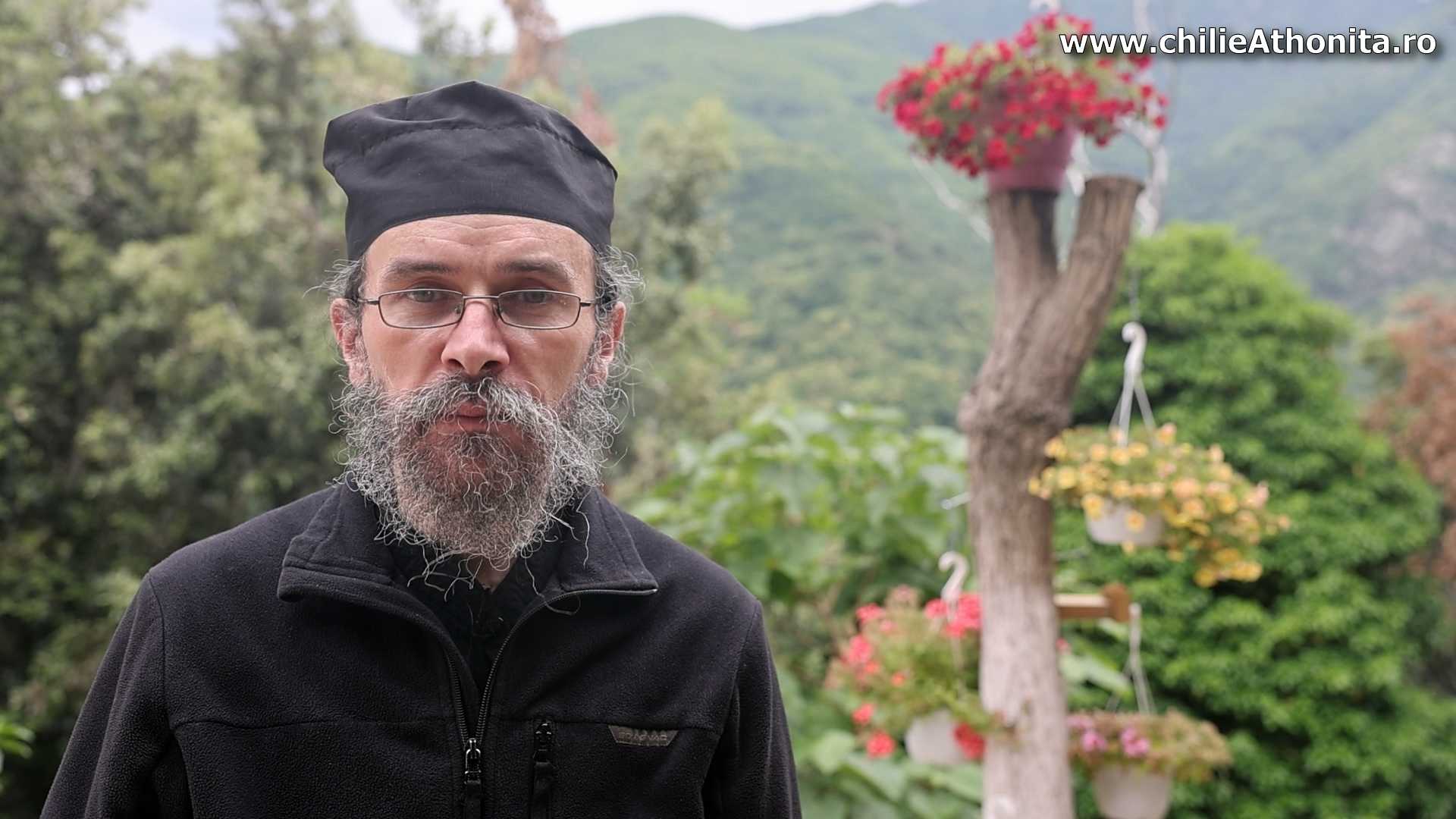
Father Efrem Atwood – Was He Guilty or Not? – Father Theologos
19 June 2022In this dialogue with Athonite monk Pimen Vlad, we present a series of apparently small mistakes, which, when overlooked, inevitably generate disastrous consequences.
Cristi Bumbenici (CB): Dear friends, we find ourselves again at the Cell of the Entrance of the Theotokos into the Temple, together with Father Abbot Pimen Vlad and today we will start a dialogue, a cycle of discussions around a context, namely: small mistakes — great sins, we will name it.
We selected some classic situations for today that we all found ourselves in, subsequently in future meetings we will present other such inclinations of ours. Father, when we talk about sin, most of the time we don’t really know how to define it, and to start I would ask you to help us actually understand what sin is. What does sin represent?
Father Pimen (FP): Yes. First of all, welcome! CB: Thank you very much for receiving us!
Sin
FP: We thank the Mother of God that we get to live this moment too. Because every moment is a gift from God! And that’s why we must always thank for every moment, for every day; that we have reached it. Yes! So what can be said? Sin…
So anything against God’s commandments is a sin. And exactly how it was said: “Which sin is unforgiven?” The sin for which we do not repent, that we do not confess or feel sorry for. That’s unforgiven. All the rest God forgives therefore, every sin, starting from the small, from a thought, from anything that is against the commandments of God. Because it is said there in the commandments: Do no harm… “Thou shalt not kill!“ There’s that and then the Savior comes and says:
“Don’t even be angry against you neighbor!”
That means, without saying anything to him, just simply in your mind, if you are angry at him — it becomes a sin!
CB: Just the thought.
FP: Just the thought! Or as it is said: “Do not fornicate!” He says: Only if you thought of a woman in your mind, you have already committed adultery! That is, you have already sinned before God. So it all starts from thought! Any evil thought, the sinful thought, which is not clean, it’s dirty, which is against everything that’s normal, — the normal normality according to God, not what is classified now [as normal] — it all becomes sin! And then, our conscience tells us. It rebukes us for a time.
A dirty thought comes, you accepted it, your conscience begins to tell you that it’s not good. But over time, if we live only in dirty thoughts, our conscience no longer rebukes us. Because we plug it up, we keep putting dirt on it, so it can’t say anything anymore.
Well, and from the thought, one goes on to deed. Because man begins with thought and then is not satisfied with just the thought, he goes on to do the deed and wants more. In this way the sin becomes bigger, and so on.
Confession of sins
CB: Alright. Now we are getting into the classic situations so to speak, and I think an introduction to them can be done by means of an attitude, which, surely, we all had at some point. I would say, “But what sin have I done? I never killed anyone! I didn’t steal, I had the right civic attitude.” But this phrase “I didn’t kill anyone” became a sort of self-justification, generally to hide what we’re not actually doing.
FP: What happens is, I was even reading in one of the fathers; Some would come to confession: “Father, I have not killed anyone, I have done no harm to anyone…”
The father took his epitrachelion: “I’m sorry, I confess only sinful people, I do not confess holy people! I mean, if you came here to brag…”
That is, at confession you go to say what you did wrong, what you did, you don’t go there to brag, “Father, I did not kill, I did not do that, so give me a crown now, somehow! I need praise, a diploma, I am telling you what my measure is! I mean, I didn’t come to repent, I came to brag about what I did, am I great or what?”
“But have you ever confessed in your life?”
“Well, never father, what did I even do?”
And when you go into his life and start to stir things up a little, you will find not those little bugs, but you find all the dragons [great sins]. Because gathered in time, for man, it’s like you have gathered and live with a bunch of animals, and you say that you have tamed them. You live in their midst and you find it normal. When in fact, you have given yourself to all these habits, these passions.
And if even Holy Apostle Paul says in the St. Scripture that even if our life lasts only a few days we cannot say that we are sinless. Because from the beginning — you see even a 1 or 2 year old child, if he does anything naughty, brakes a cup, pulls something, he quickly hides himself. So his conscience tells him that he made a mistake! You see that already from a young age they start to lie and so on, so you start gathering up [sins] for yourself.
That’s why regarding confession, it is said that from 7 years old, it’s good for children to go and confess, so that they get used to getting everything out. That is, any lie told, if they upset someone, if they pushed the other, if they did something, if they quarreled with someone. All this — so that he doesn’t reach the age of 30 to say, “I didn’t kill anyone, I didn’t do anything wrong!”
No! The one who starts to confess all these things from a young age, growing up, he immediately realizes [his sins]. It’s like a clean shirt, once there’s a spot, he sees it and quickly says, “Oh, it’s dirty!” But for him who already has two layers of dirt on his shirt, all kinds of dirt, he says: “Where is it dirty? Can’t you see…”
CB: “…that’s its color!”
How we always make mistakes. A parable
FP: Yes, “That’s its color.”
So this is happening with us. And then [we say], “I never killed anyone, I did nothing!” But in fact, we make mistakes everyday. First of all at the level of the mind. How many times we get angry a day… how many times we are dissatisfied, how many times, I don’t know, do we lie? Things that seem small; but it’s exactly like that saying: “Today an egg and tomorrow an ox!” You know? That is, from these little things you go to the big things. And you still constantly go along the line of “I didn’t do anything!”
I remember exactly something told by Ierotheos Vlachos, Bishop of Napftpaktos. When he was young, they ordained him [and] he said, “I was patient, I was eager to take the priesthood seriously. People came to confession, I was patient, I would be [confessing people] for hours…”
And once, a woman came, like how people come to confess. She comes, “Father, do you think I will confess to you, am I stupid to tell you everything I’ve done?” And she started to make fun of him. A lady who you could tell had gone through life, through a career, through everything. The father let her speak, until she began to flaunt her talents as they say, and then he looked at her, “But do you think that I need you to tell me what you did? I am not even interested in what you did! My own [sins] are enough, do you think I’m interested in all the madness… I don’t need it, you can leave and mind your business, I’m not interested.”
[She said] “What do you mean? You are not interested in what I did?”
“No! You can leave, as you wish!”
“Really? Is that so? But wait and see, I will tell you what I’ve done!” And she just goes on to tell him.
“But I’m not interested!”
“Oh so that doesn’t satisfy you? Look I did this too!”
“But I’m not interested in that either!” And for about an hour, the father said he didn’t care; she rummaged her mind to remember what she had done to show him how cool she was for what she had done. And after about an hour, she stops, she had started to unchain herself because, she had, in fact, confessed. She didn’t know what else to remember, to scare him with what she did. But nothing caught on — there was also the experience of the father. At some point she stopped and said:
“Father, have I confessed perchance?”
“Something like that! Get on your knees so I can say the absolution prayer now.”
Only after that, little by little, she realized, she felt a relief after the absolution, and began to come normally to confession. Sometimes pride does not leave us, but…
CB: I think most of the time.
FP: Most of the time! Or shame, but shame also comes from pride. And then we are constantly looking for ways to escape.
Temptations and mistakes
CB: Another mistake we constantly make is participating in all kinds of discussions in which we talk about others. Instead of talking to each other, we talk about others. And we slander, we judge, and we end up condemning others; without realizing it, or, just allowing ourselves to be carries away by this critical dialogue. It seems like a minor mistake, but in fact, judging and condemning one’s neighbor is a important sin — with extremely complex consequences.
FP: Many say, “What have I done? What have I said?” And you know what happens? For example, when two people talk about the third person who isn’t present, no matter what you say — it’s already a sin! Because no matter what good things you say, some negatives will come out too! And then this thing already becomes a sin.
It’s another thing when 3 people are discussing, and let’s say 2 of the people are accusing the third who is present: “You did this!” The other justifies himself, and you have a discussion that seeks to straighten things out between three friends let’s say. But when two people discuss a third:
“Well, have you heard what he did?”
“Oh, wait, it’s not just that! Let me tell you, what I heard!”
“From who?”
“Well, I heard it from I don’t know who! And wait and see…” and so on.
That is, we add judgment over judgment and now this is a quote from pagan philosophers even, I don’t want to get it wrong: Someone came to a great philosopher in olden times, and he says,
“I want to tell you something about your disciple, something I heard!”
“Wait a minute! Stop. The thing you want to tell me, did you see it?”
“Ah, no. I heard it from someone.”
“Oh, you heard it from someone! And do you know that it’s true?”
“Oh, I don’t know if it’s true!”
“I see. But this thing you want to tell me is it something good?”
“No, it’s something bad.”
“If you haven’t seen it, you heard it from someone, you don’t know if it’s true and finally it’s also bad, I don’t need to know it! It doesn’t help me or benefit me in any way.”
That is, usually, we can see that if something starts at one end of the village — two old elderly ladies meet and talk about someone, and that old lady goes to the other end of the village, until the evening, if someone fell and scraped his knees, at the other end of the village, it will be [said] that he broke his legs. That is, everything, from person to person becomes a big thing. From a small thing, it gets to… And here there is a little story:
Pillow… and words — a story
A woman went to confession and she started,
“Father, I did this, but it was because the neighbor told me so and so…
I did this, but the neighbor…
The godfather…
But this and that…”
That is, there was a justification for everything and judgement, “Look what the others are doing! It’s because of them! Because of…” and so on.
The priest sat, listened and took his epitrachelion. He said, “Go home and bring me a pillow. Go now, I’m waiting for you here.”
She did not live far from the church. The woman went, came with the pillow.
“Come to the bell tower with me!”
As there were windows in that bell tower, he asked the woman to unravel the pillow and to scatter the feathers, everything there was, the hen feathers. And when she scattered all of them, the wind took them. And you realize, in a pillow how much there were. And they scattered everywhere. He said:
“Now, the canon that I give you: you will go and collect all the feathers.”
“Father, such a thing is impossible!”
“Really? Those are [like] the words you say every day” since she was in the habit of talking about someone else every day, with whoever she was meeting.
“They are added up over time, can you still gather them up? You cannot! Well, that goes for words as well! You don’t know how much harm you have done to others, by slandering, judging, by pointing a finger at others.” That’s why, let’s not ever judge.
Let’s not judge!
And here I will make a sidenote. Somewhere there was a father. He went to the monastery, but he was, let’s say, slower at everything. At church he was a little late, when it was time to work, he would come out a little later. But he was always in a good mood, even if they reproached him, he smiled, and did not answer back against anyone. He was at peace in his corner. And all would say, somehow they were judging him:
“Well, he was late to church again. And at work, we wait for him…” and so on.
I mean, he was seen as the black sheep, let’s say. But he smiled at them all, they all reproached him, “Are you late again?!” He smiled, asked for forgiveness, and moved on.
Alright, and the time came for him to pass on to the Lord, the years had passed. And now they all thought — since before there was the custom for the elders — when one was close to death, they would all gather together:
“Let’s see how he leaves for God, does he leave in peace, does he go according to the life he led?”
That is, they were looking to learn a lesson from this. They didn’t run away when one was dying, no! They gathered around him. And so they all came and looked: “Oh dear, will this poor man be saved? Because look, he was late there, he didn’t do that…” And now it was time for him to leave. And they all saw that it seemed like he was discussing something with someone. Well and when he was discussing with someone, they were all puzzled by what was happening.
And the soul left. And then, one of the elders there said, “Let me tell you! You have judged him. Let me tell you what it was.
The guardian angel came with the list, and he said, ‘Look what it says here, you were late for church, you were late for work, you didn’t do the canon as you should… (that is, certain things that were on the list there) What answer do you give before God?’
And then [the father] said, ‘Holy angel, look there, does it say that I have ever judged anyone?’
The angel looked: ‘It doesn’t say this.’
And he said: ‘What is said in the Holy Gospel? Do not judge and you will not be judged!’
That’s when the angel ripped the sheet: ‘You are right. Come straight to Christ, without customs. You are forgiven for everything because you have never done this.'”
He did not judge anyone. He always chastised himself. “I’m late, I am worse, I’m so and so…!” Well, this saved him without any need for harsher struggles.
Simple ways to holiness
CB: And it is one of the safest and simplest ways, which even St. Porphyrios of Kafsokalyvia quoted.
FP: Yeah! A lot of them did. That is, simple, easy things…
CB: Within everyone’s reach.
FP: …and we can reach holiness if we want through that! Without the struggle of only eating once at sunset, of doing prostrations, or I don’t know what great ascesis and so on. That is, we can get there without all this.
Father Porphyrios gave us the beautiful path of love. He said that “Love covers everything.” That is, everything that you see bad in others you cover, you do not judge, you do not pass it on. You cover them: “Let him be, who knows why he did so…” You see yourself, and that’s why he said: “Love covers everything and it is the easiest way to salvation.” Without much struggle, without I don’t know what… He says: “Love is above all! Because the source of love is Christ and when we have love then we fulfill everything.”
A harmful mixture
CB: We have an offer before us now. It’s been years since various methods are exported to us from the West, by which we can reach a sort of spiritual fulfillment. All kinds of esoteric organizations, all kinds of constructions around ideas started from other cultures. And we find in our landscape Romanians who say this:
“I go to church, I am an Orthodox Christian, but I go there too.” Are these things compatible, or, is it, again, a great deception?
FP: Yes, exactly as the Holy Fathers said also: You have a jar of clean, beautiful honey, picked by bees, sweet, good! And then one comes and says:
“Here, I’ll give you a drop, not much, just a drop of cyanide” let’s say. “Put it in the honey!” Another one comes along:
“I will also give you a drop of viper venom. Put it in there.” Each one comes with his offer, from all directions. And what have you done with your honey? Is it better? It ruined you! Let’s say you don’t die, but you’re not healthy anymore! So it spoils everything you have because you end up with an insecurity.
And not only that. When you say, “Let me go and see, what the others have might be good…” It already means that you are not living Orthodoxy. I’ve said this many times! If we do not live Orthodoxy, it’s just like a cake, you have it, it’s beautiful, nicely adorned, and you are making circles around it, but you do not taste it. And at some point you say: “Well, it’s not good! I will go see the cake of the neighbors. Maybe it is better!” But you did not taste yours. Because you did not live Orthodoxy. Whoever truly lives Orthodoxy, confesses, lives in love, in mercy, in alms, in everything he does, that person doesn’t need anything else. Because he tasted Orthodoxy. He tasted the grace of God, the joy of grace.
Taste of Orthodoxy
When he goes to church, he sits and talks to God. He doesn’t look at what’s going on through the church. That is, he lives this thing. And that person is in grace! And he is not interested in anything anymore, all those other things, they are things which the devil uses to distract us from our path.
We have the beaten path, drawn out by the Savior. The Road of the Cross, with everything beautiful, with exactly everything we need. It tells us, “Look, you have a stop here,” over there if you have kneeled — [it tells you] what you have to do to get up. The whole way of the cross until we reach Heaven.
And these guys come and open up certain trails and say: “Hey, don’t be stupid, go this way, I will give you…” I don’t know what. Another comes from the other side: “Go this way! Go this way!” And, if we listen to these alluring whispers, we go that way. And you realize that it takes you to some brambles from which you can’t go forward or back. And it messes you up, you go crazy with all sorts of things. Well, that’s what happens with us.
Christ is triumphant
When these offers come from all those countries, from those parts, with crazy things, with I don’t know what states…
In fact we have, even with Father Paisios: “The Gurus, the Young Man, and Elder Paisios” this book, written by one who went through all this madness, through China, through India, wherever he wanted. But as he had passed by Father Paisius who had taught him to say the Jesus Prayer, even though those things tempted him, they had no effect on him. So when these great gurus were coming and he went through all their things, how [they were using] demonic power to control them, they couldn’t do that to him. Because he was saying “Lord Jesus…” And he saw [the guru] swelling, turning red, [saying], “Get out, you’re messing me up! You are throwing my plans upside down!”
So he could not, because it was the demonic side meeting with Christ. Even if he was tempted to go and see all these things, eventually they cast him out. They also wanted to kill him because he turned their plans upside down.
So it was as it is said, “…at the name of Jesus every knee should bow, of those in heaven, and of those on earth, and of those under the earth…” That is, everything kneels. And if he said “Lord Jesus…” they had no power over him.
Situations outside the Truth. Examples
CB: I will also ask you to comment particularly on a recent situation in which a group of pilgrims arrived at the Holy Sepulchre and some of them had come with someone who in the Holy Sepulchre started a sort of madness with telling the others to visualize I don’t know what light, the others closed their eyes, and the person who told the story, however, being a man with his feet planted on the ground, looked at them and saw that one of them had started to snore, another to make all sorts of sounds, and he managed to get one of his friends out of this state, literally by putting his finger in his ear, because they had all gone crazy. In the Holy Sepulchre, Orthodox Christians, went, as they say, to have their eyes roll back in the heads looking for high states.
FP: Eh. “Orthodox Christians”… I mean, as it is said, “Parents aren’t those who give birth to children, but those who raise their children properly.” That is, [you are not a parent if] you have given birth to him and then handed him to I don’t know who and you see him once a month because you are some big celebrity or I don’t know what. It’s the same thing in this case: You are not an Orthodox Christian just because you have been baptized Orthodox.
CB: Or because you visited the Holy Sepulchre.
FP: Yes. They are not related. So all these things… Because I even have to rebuke people in the church who take positions like you see at those guys who practice yoga. Immediately [I ask] “But where did you come here? Did you wake up thinking you’re at I don’t know what ashram?”
“Well no, this is how I was taught to pray.”
“From where?”
“Well, I read on the internet., it says…” I don’t know what.
“Oh, you’ve already strayed, when you start from the internet, you dream lights and so on. No. At church you don’t even stand with your hands like this [arms up in prayer] just the priest does that. So you sit nicely with your hands to your chest, you pray, not in different positions.” Or you see them closing their eyes and sitting in I don’t know what position. Because it actually seems to them like they are charging. Well wait a second! They’re starting to mix up these things. And the devil eagerly fishes these things to catch you a bit, to make you stray, as, afterwards, it’s easy, he takes care to get you into these things, to mix all these things up.
Pay attention to our duty
So we have to be very careful not to mix things up. It was left to us, very clear: The Holy Gospel, the Holy Scripture and the Commandments, nicely there. So we are not asked to…no! It’s simple.
That is, we have the Commandments; Like the First Commandment, which is very beautiful and says, “You shall love the Lord your God with all you soul, with all your mind, and with all your heart, and your neighbor as yourself.” And this fulfills all the commandments. Simple!
So the total connection with God, and God first in our lives. Waking up in the morning with, “Thank you Lord, glory to You Lord because I woke up today.” In the evening again, “Thank you God that I got home to my family healthy,” considering that so many people do not make it home or don’t wake up in the morning. I mean, there are a lot of things to thank God for.
And, as it says there, do no harm to anyone, according to what is said among people: What you do not like, do not do to someone else! That is, to always put yourself in the shoes of the other [to see] if you would like what you are doing to the other. Always doing these things. And to always lead a simple like and a Christian life, just as Father Ioanichie Bălan said, and again I open a parathesis…
CB: Please!
FP: He said that once — it was the very Saturday before the Resurrection, it was Holy Saturday — and an old woman came. Now there are buses, cars at Sihăstria. At that time the bus was passing from Poiana Largului to Târgu Neamț and would stop at Gura Secului. The people would get off and there were 7km to walk on foot. There was no asphalt to Sihăstria.
And an old woman came, she was 50-60 years old, and she had a bag of beans on her back, [she walked the] 7 km and she confessed to Father Ioanichie Bălan. She said, “Father, you know, I haven’t eaten anything since last Sunday. No water, nothing!” So it was almost the whole week, there were six days.
“I came to confess in case I may Commune for the Holy Resurrection…”
“But what sort of life do you lead?”
“Well, father, you know, I have 7 children at home, and you know it’s hard. I have children from young ages to older. And, all day food, one screams, another does something, I don’t really pray, but I don’t know…something happened to me. I struggle too to say ‘Lord Jesus…,’ ‘Lord help me, Lord don’t leave me,’ all the time.
And once, as I stirred in the polenta I kept saying the prayer and suddenly I felt like a fire. It crossed my mind and entered my heart. Tears flowed, sweat flowed, pouring into the polenta and I kept stirring, I don’t know what happened because for a few hours tears flowed continuously. It was as if I had gone into such a state, I had a fire inside and it was like I was floating.”
And Father Ioanichie Bălan said: “Well, look at that! The old lady reached the prayer of the heart among 7 children while stirring the polenta. And we struggle in the monastery and are far from such a thing.”
So do you see where God’s grace works? In simplicity, that is, where a person in his simplicity cries to God to help him, to take care of him, to take care of the children, but it is in that simplicity that God listens.
Because there was another woman who went to a father, I don’t know to who, one of those great fathers. She said:
“Father, you should know, something strange is happening to me.
“What happens to you?”
“When I pray, I rise half a meter from the ground. What could this be?”
“Oh, be at peace grandmother, because this happens to everybody.”
“Oh, so this is normal?”
“It’s normal. Go home and continue.”
What else could he tell her, otherwise other thoughts might come to her.
“Go home and continue like that, it’s good! This happens to everyone.”
CB: In other words, one should not look for high states.
FP: No, no! When God wills it, God will give it. We must not seek it, we must see our sins, to see how small we are before God. And then God takes care of everything else.
Crooked mentality
CB: We remain within the area of the church I will ask you to again comment on a strategy mistake, apparently small, but which can have really fatal consequences, namely — quite a few or enough people think this way:
“I believe in God, but I have no time to go to church now because I have other priorities. Career, family, etc. When I retire I will occupy myself with the church and the soul.” Forgetting that time may stop before retiring and/or simply no longer having the strength to acknowledge their sins and to reconfigure their lives.
FP: So what happens? I return to Father Cleopas here. He would beautifully tell a story: How the devil tricks people. And I won’t go into the whole story, but the ending of it, and what was appreciated when the devils came to give a report to the big guy [Satan], the one who was appreciated the most was the one who said, the devil comes [to the person] and says “There is Heaven, there is hell, there is God, there is Judgment, there is punishment, everything is according to Holy Scripture, everything the gospel says, is true. Nothing is false. But you have time! You have time. Not today.”
When you’re a kid he says, “You’re a kid, play! Leave the church alone. You are thinking of it now when you could be enjoying others!” After you grow up a little: “Well, you’re young. Have fun! Go out with friends…Live your life!”
After getting married: “Well, you got a wife, enjoy her. Go on vacations… Do this and that… You’re not going to go to church now.”
And years pass by again, the children come: “Well, now you have hardships, you have to feed your children, now you want to go to church?”
And if you get to old age: “Eh, if I didn’t go while I was young, why am I going there to confuse people and I can’t hear well now, they will take me to church when I die!”
CB: “…I didn’t kill anyone anyway!”
FP: Yeah, something like that. “I didn’t kill anybody anyway. I didn’t hurt anyone, so…” And you end up never taking a step in the church again, always delaying. The greatest sin let’s say, the greatest deception of the devil in people is delaying, not today, but tomorrow. You want to do a good deed: “Well, look, that neighbor, poor man, he has nothing to eat. The kids there… Let me go give him something!” The devil comes and says:
“What, are you stupid today? Stay and rest, soon the game will start, you thought to go now? Leave it for tomorrow!” And it’s always going to be “tomorrow.” And it’s never going to be today. Another thing, you want to get up for a little prayer:
“I will say the Paraklesis to the Mother of God!”
“Eh, now you want to do it, leave it for later.” Still later, fatigue comes, you go to bed. Tomorrow, tomorrow and again tomorrow. And one day death comes. And you leave.
CB: For sure! For sure it is coming!
Pedagogy of the disease
FP: Certainly it is coming! One day. It may be tomorrow, it may be the day after tomorrow, in a year, in 10 years, but it’s coming. The surest thing is that it is coming and takes us! But it does not let us know! Someone said to me, “Father, cancer, look, troubles!”
I said, “Well, cancer has put the most people into Heaven. Because it doesn’t take you right away. [Cancer] is the telegram — as they say — of death. It comes and lets you know.
“Oh, it hurts!”
You go [to the doctor] — “Cancer!”
“How much do you have?”
“I still have a month!”
So you have the time to prepare: to confess, to see how you are doing, what you can straighten out, where you were wrong, to try to straighten out your life. So it is possible! But let’s not delay, because then we do not know when we leave and how we leave.
CB: And you could say that the person who adopts this attitude, is outside of any potential relationship with God.
FP: No. He’s dead before he dies. Do you know why? Because he never does good again. All the time he postpones. Beside the fact that he does not go to church, he postpones all things.
“I will do it later…” That one always fails to do something in life. Because he always postpones.
CB: Basically, he self-condemns!
FP: Yes! He simply destroys himself, destroys the ones around him too, does not do any good, and at the end when he will be asked to give account, he won’t know why he lived on earth either! Because permanently [he said] “I will do it later!”
That is, just as the Holy Fathers say, you are turning from side to side, like that, all day long. You wait for the day to pass, it’s going slow, “Come on night, come on!” You know?
Problems of young people
CB: Alright. We will end our dialogue today with an aspect of a very painful topic that we have commented on before and we will surely discuss it again because it is about crime, in the most real sense of the word. In particular, I present to you a very common situation found in Romania and in other countries. But we are concerned with our nation.
Many young girls, 15, 17, 18 years old, underage girls, end up for various reasons becoming pregnant. Well, at that moment a typhoon is triggered in the family, most of the time, the way of managing the situation from the point of view of the parents is absolutely criminal, because they see only one solution — namely: interruption of the pregnancy.
I could encompass this attitude in two formulated ideas, so they are not taken out of a context. And that is, there are opinions like, “Better than destroying two lives — that of the young mother and that of the unborn child — it is better to give up one.”
Or another, which at least to me seemed odious:
“What’s the big deal, it’s like a roundworm, it’s like throwing away a roundworm.” That soul is not even reduced to the size of a molar, but it is compared to a roundworm which can be expelled at any time. Forgive me for the less than academic wording, but these are the words that are being used at this time by people, by parents who have girls, and this thing happens.
FP: Yes… I really remembered a case when someone went to the doctor. Same thing, two newlyweds — well they were married for several years, because newlyweds can be even those married for 10 years — and they already had two children. One was, let’s say, about seven years old. The other was younger, like a year, year and a half. She got pregnant. She went to the doctor:
“Doctor I want us to interrupt the pregnancy, because we have two, it is enough for us, how will we manage?”
The doctor sat, listened to their plea, to their reasons and said, “Well, you’re already 3 months along. I put your life at risk too if I do this. Let’s find another way, here’s what I will do, I say you keep this baby, continue with the pregnancy to the end give birth to him and bring the one who is one and a half years old and will we cut his head off and it will be over. Why complicate things? You will still have two. Nothing will happen to you either. That is, everything will be good because otherwise we put you in danger.”
“Ahhh, Doctor, but that’s a crime!” “Really? But what you want to do, what is that called? It’s the same thing. The child is formed already, it’s the same thing.”
The meaning of abortion
And after he told them a few more things then they woke up and kept looking at each other and went home.
They saw…That is, people do not understand what they have done. So these are things that somehow we try to make small: “It’s nothing! It’s nothing important.” But do you know what it is? A premeditated crime. Judges give 20 years or so of prison time for this when it happens. Because with premeditation, that means you think, you make plans at home and you go to the doctor. And you do that. So this is a crime.
Let that be clear. You know, that’s why so many things happen in the world, so many troubles, suffering, due to these crimes that are being done. Mothers who kill their children. So we are not saying that a stranger kills, but the mother herself who should be….
We see in animals how much they protect their offspring, the things they do, and a mother [says] so simply, as if no big deal: “I got rid of him.” That is, she is pleased when she comes out from the doctor because “I freed myself.”
CB: It is at least just as scary the attitude of parents because, well, you accept that a mistake has happened, but this mistake turns, as you said, into a crime that has, or can have, catastrophic effects on that mother, on the parents. And the parents minimize it by saying: “Eh, leave it, she’ll have time to do something else when she gets older.”
FP: Yes, but they do not realize how many cases I encounter:
“Father, we want a child, we cannot have one!
“But why? What’s the situation?”
“Well you know, when I was young, I was stupid, I did not know, I got pregnant and I got rid of it. That’s what happened because you know, I was young, I was ruining my life, I was a student, I was so and so…”
“And what is it that you want now?”
“Well I want a child and look, I can’t have one!”
“Well God gave one to you. If you kept it, God would take care of your career, would take care of the needs of your child, would take care for all to be well, and would give you more children. But this is the reward [for what happened]!”
And not only that! I’ve come across many cases that couldn’t have any more children, why? Because the doctors cut something there, by mistake, according to what they knew. And they could never have children again. Because with these things certain problems in the body happen too. Because the child has to be carried, is formed to go to the end, to 9 months. You interrupt it, cut, destroy and in many cases, they can’t have children anymore. And not only that, later on many women get cancer.
CB: And they get angry with God.
FP: Yes! “Why did God give me this?” But you don’t look at what you did, because you actually contributed to this. Apart from the crime you did, you destroyed something inside yourself. And then there are these consequences. Because very many women write to me:
“Father, if I could turn back time, look, I have one, two, three and so on [abortions]… I’m sorry…” You wanted to live your life. Here’s the aftermath.
CB: Bear the consequences.
FP: That is, can you live with that? Plus, your conscience, plus all the suffering, plus everything else. See, no one calls you “mom” because you can no longer have children. That is, there are a lot of consequences. Plus one day you will go to God and give account for the murder.
Laws…
CB: It should also be added that in the European area, there is a country that has passed a law… and I ask that you continue to talk about this novelty…
FP: Yes, really! I have seen some news in I don’t know in which country, which says that they have the right to kill the child until a month or two after birth.
CB: Already born?
FP: Yes born! If you don’t like him, if he doesn’t look like how you want, if he is not perfectly like how you want, you have the right to kill him. So legally. The law has been approved.
CB: So we don’t accept rejects anymore.
FP: Yes, somehow everything must correspond beautifully — blue eyes, I don’t know what, if not, we’re done with him. You have the right to kill him. You see where we got to?
CB: Where we chose.
Departure into eternity
FP: Yes. And we chose it. We cast God aside and preferred good living and so on as if we were eternal here on earth. Can’t we see? Every day people around us leave? And what do we do when we go beyond? Since we are leaving, we are going to eternity, not for one day, and we should prepare every day, to send something in eternity to find it there.
You came to Athos now, for 2-3 days, a week, you took luggage, 2-3 changes of clothes, something. You calculated how much you need for 2-3 days, a week, but think about eternity, we are going somewhere that never ends. I mean, what do we take with us there? You can’t take things with you when you leave [for eternity], look at a millionaire and a poor man, what do they take with them when they go beyond? Both of them take nothing! So you find everything that you sent there.
Let us be clear! And that’s why I say we should send a little bit every day. A little mercy, a prayer, a good deed, a good thought, a good word, all this goes beyond. And then we’ll find them!
Conclusions
CB: That’s it for today, we will continue, I will come up with other examples in this category. I will just add that our friends who follow us, can obviously subscribe to this YouTube channel and can participate concretely through the thank you button, so that these productions can continue.
Thank you father! And let’s say one more thing — and I ask for forgiveness from our friends in advance — that if we were all reduced to the condition of roundworms, we who spoke so far would not exist, and you who watched us, could, of course, not follow us.
FP: Every person has his own purpose in life. So God did not give anything by chance on Earth. Any child who is born, has a purpose in life, contributes something to the improvement of the world that we live in.
CB: God did not create roundworms, He created us.
FP: Yes! And all the time, a child who is killed, disrupts something in society, in everything there is. Just like a perfect machine; you take a screw out of here, one out of there, you take a wing off, something, you disrupt it, and it starts to work like this [shakes back and forth]. This happens because with God nothing is accidental.
CB: Thank you very much!
FP: May the Mother of God help us, keep us under her protection, and enlighten us to become a little bit better. A little bit.
CB: Today!
FP: Tomorrow whatever God wills! But today let us become a little better, more humble, more loving and more hopeful in God!
CB: God help us!
FP: God help us!
Online commemoration lists and donations
May the Lord help us!
Online Commemoration Lists and Donations
May the Lord help us!
If you have a bank card and wish to send commemoration lists and donations online using your card, and/or to support our philanthropic activity, including this site, please fill out the form below to make a small donation. The form is secure – we use Stripe for payment processing – a world leader in this field. We do not collect your personal data.
If you do not have a card, or do not wish to use it, visit the webpage for Online Donations and Commemoration Lists.
We will pray for your loved ones! (Please do not include inessential details like wishes, degree of kinship, introductions etc. JUST the name!)
Especially for recurring commemoration lists, we ask that you please keep them to under 20 names long. If you include a member of the family, we add “and for their families.”


